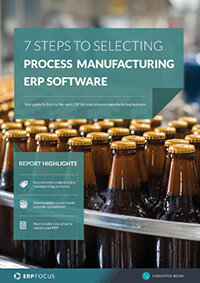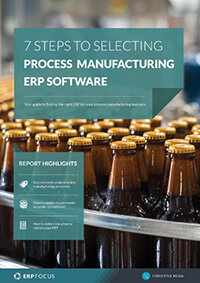The two key benefits of ERP for food companies
Like any specialty business, food companies have their own challenges such as inventory management, food safety and product reliability. As a result, industry-focused ERP systems have been created to help meet these challenges head on.
Those in the food industry know that to succeed, reducing waste is a top priority. As small margins are the norm, excessive food spoilage can ruin any business. ERP for food companies enables tracking of every single ingredient through processing, packaging, warehousing, transporting and shelving at the retailer. By having a single system that can manage all of these processes, a company can streamline its operations, improve its productivity, reduce its waste and increase its profits.
A good ERP system, for instance, enables a food company to know when it is low on a particular inventory item so that it can be refilled immediately. It also allows for fluctuation during peak and dip product seasons. By ordering just enough inventory, demand is met and inventory waste is kept to a minimum. Responding in this as-needed fashion is profitable for any business but especially one in which expiration dates force a product to move quickly.
1. Keep on top of ever-changing safety standards
Food safety is always of top concern. With federal regulations in a state of perpetual flux, food companies who succeed must be able to meet - and show that they meet - new safety regulations. Having a dynamic ERP system in place enables a food company to efficiently manage its food inventory, a must when dealing with products that have a shelf-life and must be stored at specific temperatures.
Food businesses are tasked with effectively handling food safety issues. Failure to do so can cost them their business. For instance, if a specific food product has been recalled by the U.S. Food and Drug Administration, the manufacturer must pull this product right away. ERP systems make this task much easier because managers can quickly locate the product for removal. Without an ERP system in place, managers may struggle to find the recalled food products, causing a delay in its removal. In the interim, customers could buy the product and get sick or worse.
2. Consistently deliver reliable food products
In today's global economy, customers can shop at their local food store and buy brand-name products from across the world. More than demanding these once hard-to-find products, customers want them to be available year-round and to be of high quality. As a result, food companies need to manage their inventories so that they are consistent and reliable.
To do this efficiently, businesses are adopting ERP for food companies. These industry-specific systems allow companies to centrally manage their entire operations including the suppliers, warehousing, transportation, storage and shelving. Companies would struggle to operate effectively at this scale without adopting ERP efficiencies, as there are many possible points for error across the operations spectrum.
Free white paper

7 Steps to Selecting Process Manufacturing ERP
Your guide to finding the right ERP software for your process manufacturing business

Related articles
-

ERP for Food Distributors: Key Functionality
In a modern world where products are tailored to consumers, why should ERP for food distributors ...
-

Secret KPI: Why Your ERP Implementation Team Matters More Than Software
Learn how Godlan ensures successful ERP implementation for manufacturers with proven strategies &...
-

Process manufacturing ERP: formulas and recipes
Find out about the challenges your process manufacturing ERP will face when it comes to recipes a...

